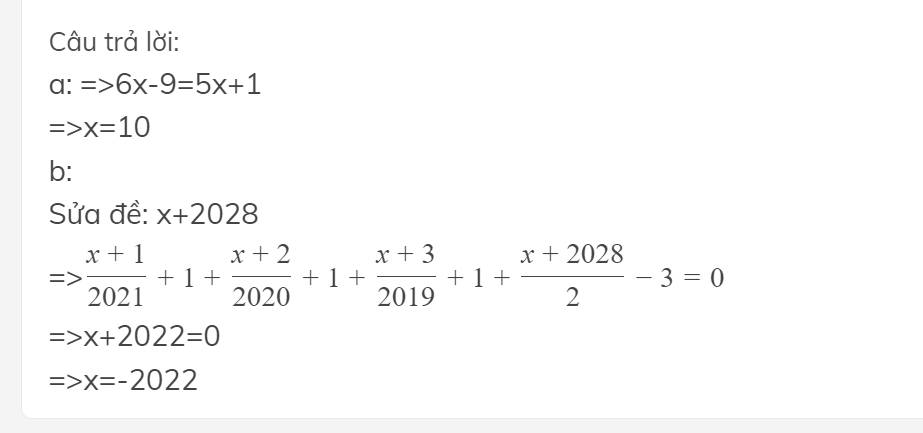(2x-1)2 +(x-3).(2x-1)=0
giải giúp e với ạ
Hãy nhập câu hỏi của bạn vào đây, nếu là tài khoản VIP, bạn sẽ được ưu tiên trả lời.


\(4x^2+4x+1+4x+2-2x^2-x\le0\)
\(\Leftrightarrow2x^2+7x+3\le0\Leftrightarrow\left(2x+1\right)\left(x+3\right)\le0\)
TH1 : \(\left\{{}\begin{matrix}2x+1\ge0\\x+3\le0\end{matrix}\right.\Leftrightarrow\left\{{}\begin{matrix}x\ge-\dfrac{1}{2}\\x\le-3\end{matrix}\right.\)<=> -1/2 =< x =< -3
TH2 : \(\left\{{}\begin{matrix}2x+1\le0\\x+3\ge0\end{matrix}\right.\Leftrightarrow\left\{{}\begin{matrix}x\le-\dfrac{1}{2}\\x\ge-3\end{matrix}\right.\)( vô lí )

a,\(\left(x-4-5\right)\left(x-4+5\right)=0\Leftrightarrow\left(x-9\right)\left(x+1\right)=0\Leftrightarrow x=9;x=-1\)
b, \(\left(x-3-x-1\right)\left(x-3+x+1\right)=0\Leftrightarrow2x-2=0\Leftrightarrow x=1\)
c, \(\left(x^2-4\right)\left(2x-3\right)-\left(x^2-4\right)\left(x-1\right)=0\)
\(\Leftrightarrow\left(x^2-4\right)\left(2x-3-x+1\right)=0\Leftrightarrow\left(x-2\right)\left(x+2\right)\left(x-2\right)=0\Leftrightarrow x=-2;x=2\)
d, \(\left(3x-7\right)^2-\left(2x+2\right)^2=0\Leftrightarrow\left(3x-7-2x-2\right)\left(3x-7+2x+2\right)=0\)
\(\Leftrightarrow\left(x-9\right)\left(5x-5\right)=0\Leftrightarrow x=1;x=9\)

\(S=\sqrt{x^2-2x+1+9}=\sqrt{\left(x-1\right)^2+9}\ge\sqrt{9}=3\)
chọn B

Hình hiển thị bị lỗi rồi. Bạn nên gõ hẳn đề ra để được hỗ trợ tốt hơn nhé.
d) \(\left|2x-3\right|=x-3\)
TH1: \(\left|2x-3\right|=2x-3\) với \(2x-3\ge0\Leftrightarrow x\ge\dfrac{3}{2}\)
Pt trở thành:
\(2x-3=x-3\) (ĐK: \(x\ge\dfrac{3}{2}\) )
\(\Leftrightarrow2x-x=-3+3\)
\(\Leftrightarrow x=0\left(ktm\right)\)
TH2: \(\left|2x-3\right|=-\left(2x-3\right)\) với \(2x-3< 0\Leftrightarrow x< \dfrac{3}{2}\)
Pt trở thành:
\(-\left(2x-3\right)=x-3\)
\(\Leftrightarrow-2x+3=x-3\)
\(\Leftrightarrow-2x-x=-3-3\)
\(\Leftrightarrow-3x=-6\)
\(\Leftrightarrow x=-\dfrac{6}{-3}=2\left(ktm\right)\)
Vậy Pt vô nghiệm

1:
=>|2x+5|=5
=>2x+5=5 hoặc 2x+5=-5
=>x=0 hoặc x=-5
2: =>|x-2|=3
=>x-2=3 hoặc x-2=-3
=>x=-1 hoặc x=5
3: =>|2x-1|=1
=>2x-1=1 hoặc 2x-1=-1
=>x=0 hoặc x=1

\(\left(x^2-9\right)^2-\left(x-3\right)^2=0\)
\(\Leftrightarrow\left(x-3\right)^2\left(x+3\right)^2-\left(x-3\right)^2=0\)
\(\Leftrightarrow\left(x-3\right)^2\left[\left(x+3\right)^2-1\right]=0\)
\(\Leftrightarrow\left[{}\begin{matrix}\left(x-3\right)^2=0\\\left(x+3\right)^2=1\end{matrix}\right.\)\(\Leftrightarrow\left[{}\begin{matrix}x-3=0\\x+3=1\\x+3=-1\end{matrix}\right.\)\(\Leftrightarrow\left[{}\begin{matrix}x=3\\x=-2\\x=-4\end{matrix}\right.\)





\(\left(2x-1\right)^2+\left(x-3\right)\left(2x-1\right)=0\)
\(\Leftrightarrow\left(2x-1\right)\left(2x-1+x-3\right)=0\)
\(\Leftrightarrow\left(2x-1\right)\left(3x-4\right)=0\)
\(\Leftrightarrow\left[{}\begin{matrix}2x-1=0\\3x-4=0\end{matrix}\right.\)
\(\Leftrightarrow\left[{}\begin{matrix}2x=1\\3x=4\end{matrix}\right.\)
\(\Leftrightarrow\left[{}\begin{matrix}x=\dfrac{1}{2}\\x=\dfrac{4}{3}\end{matrix}\right.\)
Vậy \(S=\left\{\dfrac{1}{2};\dfrac{4}{3}\right\}\)